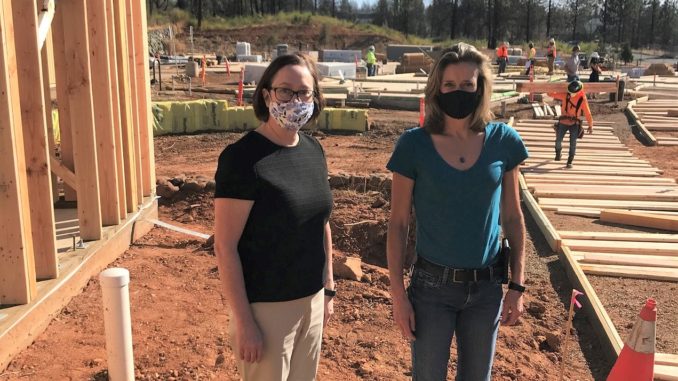
Charles and Jenn Brooks moved to the Ridge in the spring of 2004, drawn by the charming, affordable mountain town in the hills just above their college city.
Paradise is where their two sons were born, where their family created fond memories at community events like Gold Nugget Days and the Parade of Flags. They’d take the boys to Dolly-‘O’ Donuts to celebrate after soccer games. During Christmastime, they’d pick out a tree from the surrounding forest.
The Brookses found comfort from living a quiet life among the pines—hiking, fishing and enjoying the beauty of the outdoors.
Paradise was home.
Then the Camp Fire happened. Like tens of thousands of their neighbors, the Brooks family lost everything.
Two years later, they’re still renting in Chico. But the Brookses are almost ready to come back home: Their rebuild should be completed early next year.
“I wasn’t ready to give up on that [life],” Charles said on a recent afternoon in his downtown Paradise office. “I want that back again. And I want my kids to be able to [continue to] experience that.”
That’s been the driving motivation for him, the founder of the Rebuild Paradise Foundation, a nonprofit established in June 2019 and dedicated to helping residents return to the Ridge and rebuild.
Paradise is nowhere near what it was prefire. Dead and dying trees still loom over empty lots. Folks are still living in RVs on their burned-out properties. Many key recovery projects—such as road repairs, a town sewer, an emergency-notification siren system and tree removal—are in various stages of planning.
But there has been progress. There are significantly more people back at home on the Ridge than there were one year ago, when only 12 homes had been rebuilt. Now, 445 homes have been completed and the town has issued 1,194 single-family housing permits.
Even with the challenges ahead, the slow but steady progress has made town leaders hopeful for the future of Paradise.
However, recovery will take time, and not everyone has the means—or feels safe enough—to come back.
Before the fire, Paradise was considered an affordable housing community. Folks were able to buy or rent decent homes with spacious yards in quiet neighborhoods for much less than equivalent housing in cities like Chico. That affordability, coupled with the rustic charm and slower pace of life, is what drew many families like Brooks’ to the Ridge.
It’s also what has made rebuilding and resettling there challenging for some survivors.
Waiting for a lifeline
Many homeowners are unable to rebuild currently due to the costs, said Town Manager Kevin Phillips—Paradise had a much older housing stock, and with new building codes and market rates, reconstruction can be costly.
Relief is on the way, however. Through the Community Development Block Grant Disaster Recovery program, Paradise is waiting on $55.9 million dedicated to creating affordable multi-family housing. Camp Fire survivors who own property and are considered low to moderate income will be eligible for grants of up to $200,000 from a pool of $205 million from the state to assist in their rebuild.
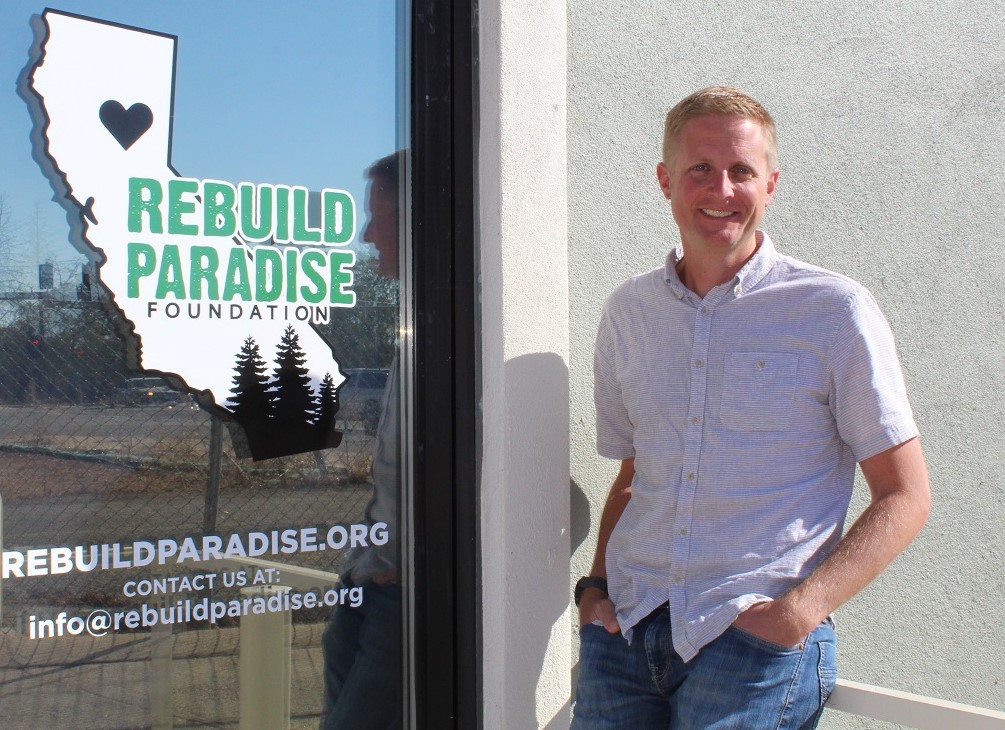
In the meantime, the town and community organizations have helped make the rebuild process smoother and more affordable.
On Oct. 13, the Town Council extended until June 2021 its Housing Urgency Ordinance, which allows residents to live in an RV on their property with a temporary use permit. It was set to expire at the end of this year.
“We’re hoping this [extension] is that lifeline for those individuals [who] aren’t able to [rebuild],” Phillips said.
Meanwhile, Rebuild Paradise worked with architects to create several 750- to 1,800-square-foot home floor plan renderings, available to residents at a low cost (they can be viewed at rebuildparadise.org). So far, the plans, which are pre-approved by the town and Butte County, have allowed 40 property owners to save thousands of dollars, Brooks said. Rebuild Paradise will soon be adding more options to the library.
The nonprofit also offers multiple grant programs, such as one that covers up to 50 percent of septic repair costs for low-income households and “missing middle” gap financing. Another key resource it has offered is an interactive land map, created in partnership with Chico State to help residents save on surveying costs.
Rebuild Paradise’s next endeavor is to work with partners to try to reduce insurance costs on the Ridge.
“It’s a heck of a process [to rebuild], and that’s one of the reasons why we developed these resources,” Brooks said. “I totally get why people just said, ‘You know what, I just need to start my life over and I don’t have the time or energy.’ … But if you have the desire and you want to come back, there are … organizations that are here with various resources to help.”
Town leaders know that renters are a missing demographic with needs that haven’t been addressed, Phillips said. Staff will have to hire a consultant to help administer the federal block grant funds, which come with specific requirements, then reach out to developers interested in creating low-income and affordable multi-family housing. The town won’t know if the funding will cover all the lost units until a consultant can pencil things out.
“The goal is to obviously get as many dwelling units available as possible,” Phillips said. “We’re hoping the multi-family support helps those renters that were here before the fire.”
The town has received applications for 265 units of multi-family housing—of those, 216 have been permitted and 70 have been rebuilt.
This includes Paradise Community Village, a project of the Community Housing Improvement Program (CHIP). It was the first affordable-housing complex completed on the Ridge, back in 2013, and it will be the first to return should its rebuild be completed as scheduled in November 2021.
Kris Zappettini, vice president and director of rental housing for CHIP, said Paradise should be “very inclusionary” with housing, offering a variety of options for households that can’t afford high-end homes.
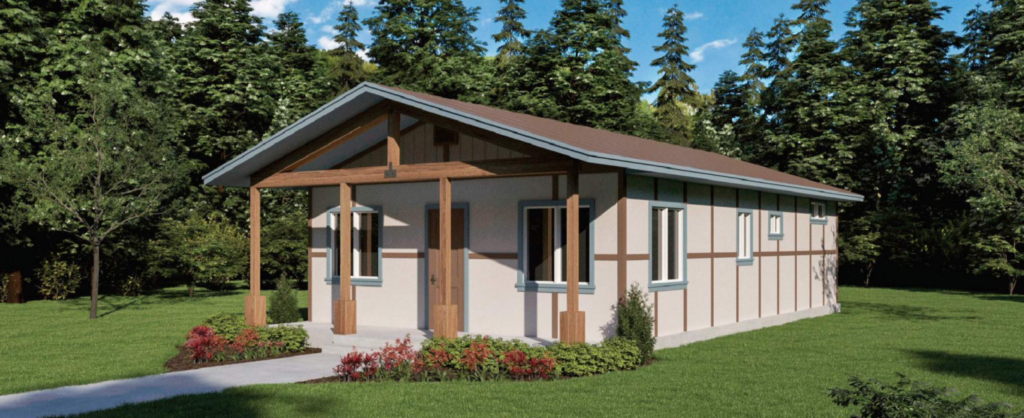
CHIP already has drawn tremendous interest, even with Paradise Community Village’s projected completion date so far out. The complex will have 36 units, the same number it had before the fire, yet more than 140 households have expressed interest in applying.
“We lost a lot of significant housing stock in the fire,” Zappettini said. “The more we can invest in building the housing stock that’s affordable for that community, the better it is for the community.”
Fears linger
Paul Wright and Christina Seashore awoke the morning after they closed on their home to see amber skies and falling ash.
It was like they were back in Paradise again on Nov. 8, 2018. Except this time, they were in Chico in September 2020, and the raging fire was the North Complex. That wildfire would trigger evacuations within the Camp Fire burn scar.
“That was a really surreal thing,” Wright said. “It was like, ‘Whoa, is [buying] the right decision?’ That jarred us. But we know we’re safe in Chico.”
Like many survivors, Wright, Seashore and their two children moved around quite a bit after their home burned to the ground. They considered rebuilding, but the family found the prospect to be daunting financially and emotionally. They felt there was no clear picture of how to move forward and get the financial support to do so.
“We had to make a choice: We couldn’t rebuild and keep ourselves housed with the way our insurance works and what appeared to be the costs,” Seashore said.
Coupled with that are their fears of wildfire safety. During several visits to their property, Wright said, they’ve noticed dead and dying trees and overgrown brush and weeds along the way.
Phillips said the town is working with partners to make progress on fire breaks in danger zones outside town and to educate residents on weed abatement and fire safety in landscaping and homes. However, risks always remain in a forest community (see “California will burn,” page 16).
On top of everything, it’s been hard for the family to process the trauma from the Camp Fire. Seashore is an artist who lost 20 years’ worth of work and her studio.
“Every time I would go up there, it was just reliving so much pain and grief about what’s lost,” she said.
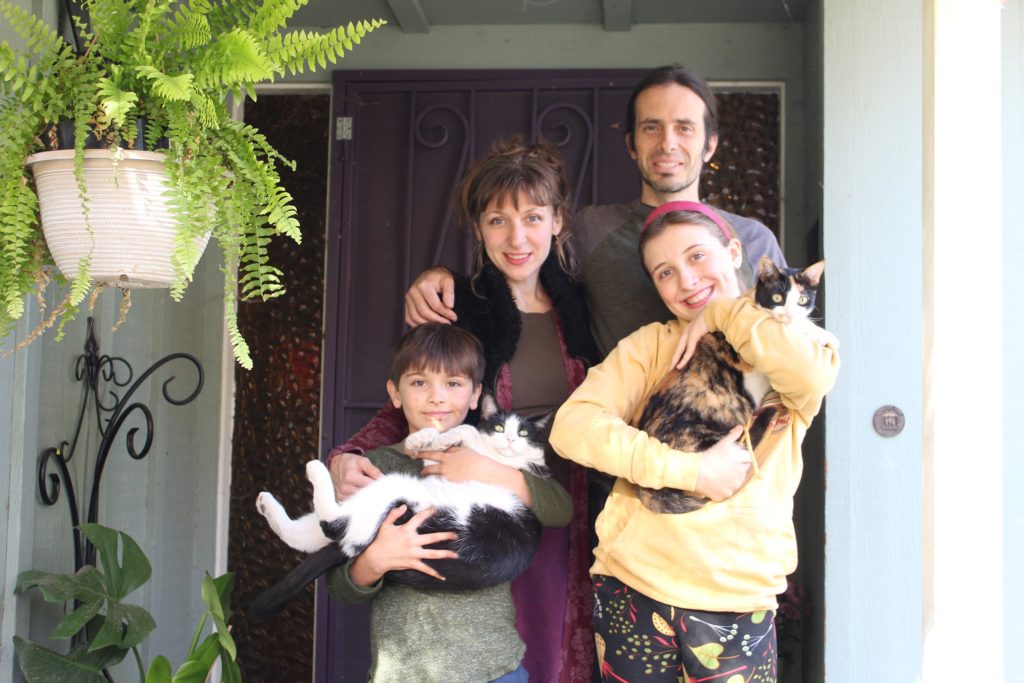
Over time, Wright added, the family decided, “Let’s just settle here [in Chico], let’s have some closure with this, even though it’s not the ideal place.
“The psychological impact, just because our family’s already super sensitive … it’s just been an insane ride.”
September marked less than a month after Phillips took on the role of town manager, having previously served as manager of the Paradise Irrigation District. The town was placed on evacuation warning as the North Complex Fire raged through the foothills.
This time, Paradise escaped destruction. But the fast-moving blaze took 16 lives and wiped out nearby Berry Creek, just as the Camp Fire devastated the Ridge two years earlier.
Wildfire safety is a key component in the vision of Paradise’s Long-term Community Recovery Plan, which was finalized in June 2019. It’s a blueprint for recovery including specific projects related to safety and the rebuilding and improvement of the town, funded by a grant from the North Valley Community Foundation’s Butte Strong Fund. It was created with resident input and completed with dozens of partners, including housing, economic development, arts and culture, and other community organizations; public agencies; churches; schools and universities; and utility companies.
Phillips said all of the town’s current projects are in line with the long-term plan, which is “solely focused on that rebuild and bringing people back up and making sure there are resources that are available for individuals [who] are here.”
He added that the town is moving forward on almost all of the tier 1 projects—designated as the highest priority to residents and most critical for physical recovery and fire safety.
This includes an emergency notification system with sirens. The town received grant funding from the Federal Emergency Management Agency and hired a firm to create a design, which is being finalized, Phillips said. It currently includes 18 sirens that can not only sound alarms but can communicate voice messages. These would be linked with text-message, phone-call, email and radio alerts in a system managed by the Paradise Police Department in collaboration with the Butte County Sheriff’s Department.
The town has to apply for a second FEMA grant to fund the construction.
“Our goal is to have an early warning system in by next fire season … to give [concerned residents] a little bit of a comfort knowing that if something were to happen, there’s a way to be communicated to,” Phillips said, “even in the circumstances of having no power and no internet and no cell phone service.”
He is confident that the state tree-removal program, the delay of which has frustrated councilmembers and residents, will begin before the end of this year.
“That will give everybody much more comfort,” he said. “That will eliminate not only the hazards of a tree falling but also the hazard of that tree being a fire danger.”
In addition, the town has received millions of dollars in funding for roadway repairs and upgrades: $77.3 million from the Federal Highway Administration and FEMA to repave roads damaged during the Camp Fire and $1.8 million from the Economic Development Administration to conduct a study of the town’s road systems with the goal of improving evacuation routes, another tier 1 priority. Road repairs likely won’t begin until 2024, however, as utility undergrounding has to be completed first.
‘All eyes’ on Paradise
Councilwoman Jody Jones, who was mayor during the Camp Fire and its immediate aftermath, said it’s the Town Council’s priority to help the people who were in living in Paradise before the fire come back home—but the road to recovery is going to be long. The town has to consider the fact that many people have chosen not to return, and has to find ways to encourage new people to move there.
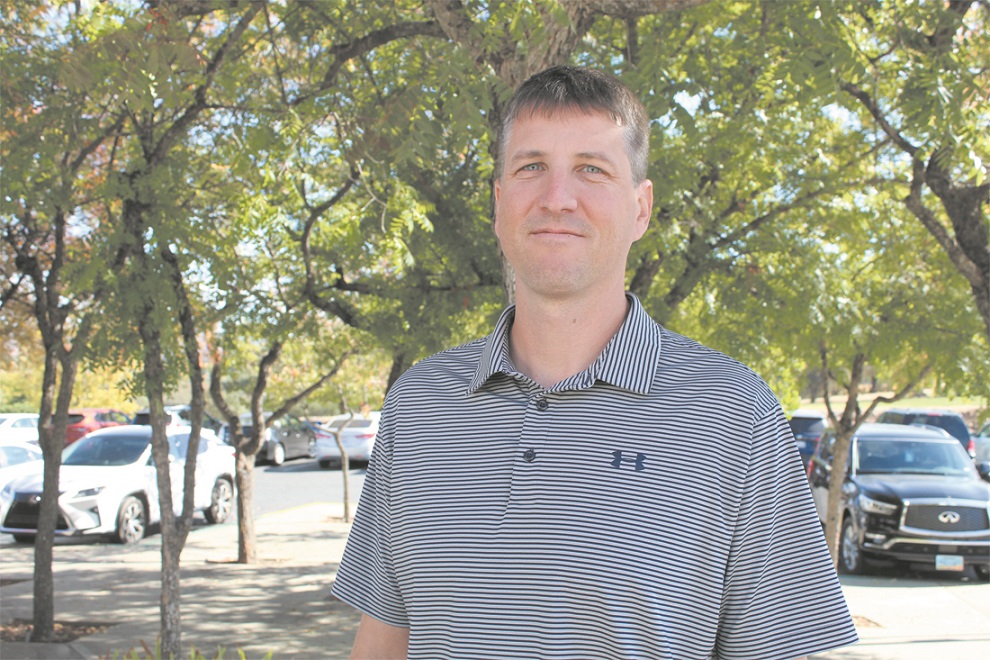
“Give us five years, and we’ll have all brand-new streets, we’ll have a sewer system, all the homes that will be built will be brand new, there will be new businesses in town,” she said, adding: “It’s a process, and it’s going to take time. Good things are worth waiting for.”
Phillips said the town is looking at how to partner with all of the groups focused on recovery to adopt a shared vision and market Paradise not just locally but regionally, “to see if there’s a way we can draw people up [who] are looking for this lifestyle that we can offer.”
For Brooks, it’s impressive what the town has been able to accomplish in just the past year. Builders and contractors haven’t slowed down, even through the global pandemic. Similar momentum has propelled him forward, even during a long rebuild process for his own family. He pivoted from a job in sales to running the Rebuild Paradise Foundation full-time.
Brooks knows the recovery is going to take generations, he said, but he wakes up looking forward to his work, inspired and motivated by his fellow Paradisians and the progress everyone has made.
“I think the most amazing thing to me is that despite every challenge that the world has thrown at our community, people still have the pioneering spirit and are figuring their way through this,” he said. “If those of us who are figuring out and working through this path can help others return and share our lessons learned and how we got through it and help support others, that just shows the strength in our community.”
While Wright and Seashore have purchased a home in Chico, they’re still Paradise property owners. Right now, the prospect of returning is painful. But Seashore said she still has hope. They’re waiting to see how the community evolves and are getting involved in other projects to help survivors recover in the meantime.
What she wants for the town she loves—where she’d breathe in the fresh mountain air and delight in seeing deer outside her living room windows every morning—is for it to be safe.
“It’s important, in my eyes, that there’s a new understanding of what it means to be stewards of the land there,” Seashore said. “There could be an amazing revolution of an earth-sustainable community. This is the opportunity right now to do that. All eyes are on Paradise.”
More Camp Fire second anniversary stories:
California will burn
Burning questions


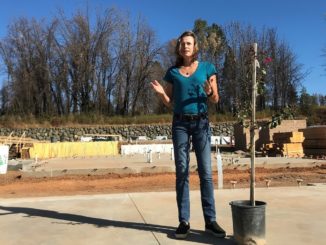
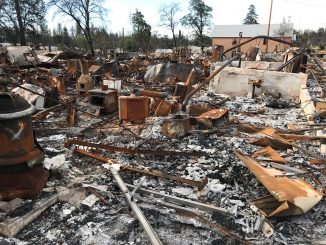
Be the first to comment